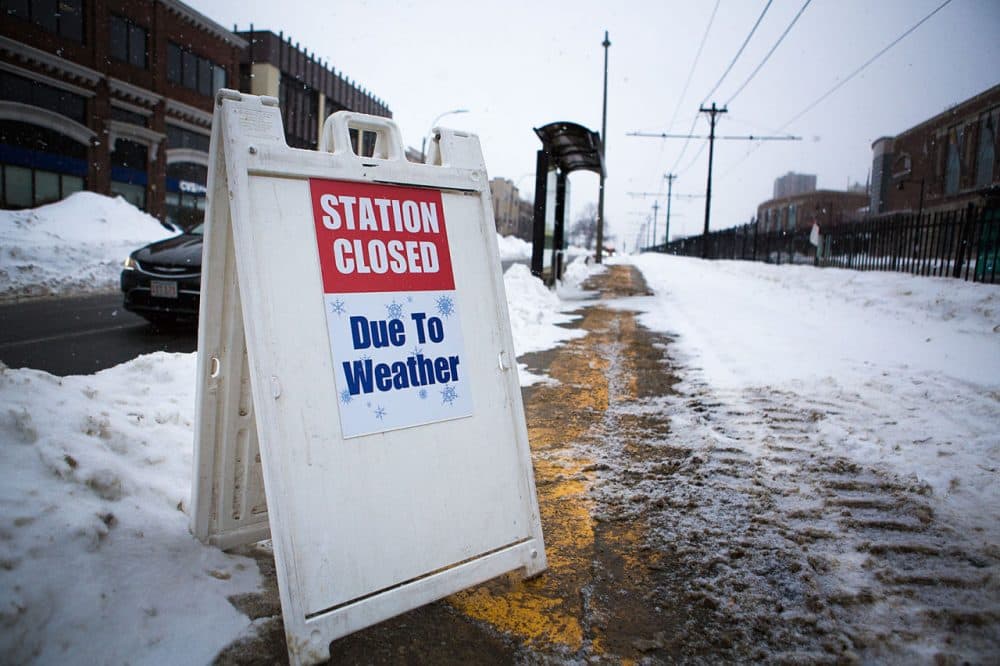Advertisement
WBUR Poll: Bostonians Believe Fixing MBTA Should Be A 'Major Priority' For Gov. Baker
Resume
Commuting anywhere on the MBTA lately has become a test of patience. But these transit woes may be more than transitory grumbles. A new WBUR poll (PDFs - topline, crosstabs) finds the problems could also become a political liability for the new governor.
While only 5 percent of Boston area residents say Gov. Charlie Baker is most responsible for the troubles with the MBTA this winter, 81 percent of those polled say addressing the T's problems ought to be a "major priority" for his administration going forward.
"When you have an issue that is sort of stirring up this much passion and so many people saying it should be a major priority, it's something that you can't afford to ignore for very long," said Steve Koczela, president of The MassINC Polling Group, which conducted this survey of 505 Boston area voters for WBUR between Feb. 12 and Feb 15.
But at a press conference last week, the governor dodged responsibility.
"I don't have any direct authority over the MBTA at all," Baker said. "I have one seat on the board."
That may be true, but the governor's rhetoric does not comfort people like poll respondent Karanjah Gordon, 30, who lives in Dorchester and relies on the T to get around town.
"When you have an issue that is sort of stirring up this much passion and so many people saying it should be a major priority, it's something that you can't afford to ignore for very long."
MassINC pollster Steve Koczela
"Lord knows if we have another bad winter like this what's gonna happen again?" Gordon said. "It's definitely the responsibility of the governor. He runs the state doesn't he? Being the governor of Massachusetts and it is the Mass Bay Transportation Authority — MBTA — that's his responsibility."
Sure, the T has seen better days. And people are viscerally angry right now. But Koczela compares this polling to previous data and says it looks like a moment of crisis.
In January, WBUR polling showed 11 percent of Boston area residents considered the MBTA in “poor” condition. That number jumped to 39 percent this month. And only a slim 1 percent of people polled said the MBTA is in "excellent" condition.
"There's much more belief that this is an old and out-of-date systems problem and not that it's a problem with management at the MBTA," Koczela said.
But the public seems uncertain where to point fingers. A lot of Boston area residents put the blame on the state Legislature (27 percent) and former governors (25 percent). Nineteen percent blame Beverly Scott — the general manager of the T. Just 5 percent say Gov. Baker is to blame.
Poll respondent Olivia Ferrante is legally blind and says she can't drive, so she depends on public transportation.
"The trouble at the T [is] too many chiefs and not enough Indians," she said. "They have a lot of very, very high priced management ... and I don't think they do what's right."
Ferrante says Gov. Baker seems to have weathered the winter storm travel woes well. "He only has so much that he can do," she said.
But Koczela says most people are still looking to him for solutions.
"From a public opinion standpoint, there needs to be the appearance that he's in charge," Koczela said. "These are the kinds of the numbers you tend to see in a crisis. This is an issue which cries out for someone to be in charge."
And in a press briefing Tuesday, Baker seemed to show a new, more hands-on approach.
He said his staff is now meeting with MBTA officials twice a day to figure out how to bring the system back to full capacity as quickly as possible.
Many transit experts say money is part of the solution. But the WBUR survey finds the public is divided on paying more taxes to improve the T — 48 percent support the idea, 48 percent don't. So Koczela says how Baker navigates this crisis is tricky.
"He's said that he is not gonna raise taxes, so he's got this problem which appears to demand new taxes," Koczela said. "People are split on it and he's said he's not gonna do it, so how does this problem get fixed?"
The general manager of the T says it'll likely be weeks before the MBTA gets back on track. The question is, whenever that happens, will Gov. Baker symbolically be sitting in the conductor's chair?
Methodology: The WBUR poll surveyed 505 registered Boston area voters between Feb. 12 and Feb. 15. The poll has a base sample of 405 residents in the entire area, including Boston, with an additional 100 voters living in the city of Boston. So between the base sample and the oversample, a total of 215 Boston voters were interviewed. The Boston area is defined as communities inside Route 128 or straddling that corridor. The margin of error for the full sample is 4.9 percent and the margin of error for the Boston statistics are 6.7 percent.
This segment aired on February 17, 2015.
